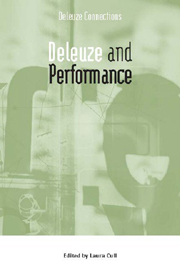Book contents
- Frontmatter
- Contents
- Introduction
- 1 Performing in the Chaosmos: Farts, Follicles, Mathematics and Delirium in Deleuze
- Act I Deleuze on Theatre: Artaud, Beckett and Carmelo Bene
- 2 I Artaud BwO: The Uses of Artaud's To have done with the judgement of god
- 3 Expression and Affect in Kleist, Beckett and Deleuze
- 4 A Theatre of Subtractive Extinction: Bene Without Deleuze
- Interval
- Act II Confronting Deleuze and Live Performance
- Interval
- Act III A Digital Deleuze: Performance and New Media
- Notes on Contributors
- Index
3 - Expression and Affect in Kleist, Beckett and Deleuze
from Act I Deleuze on Theatre: Artaud, Beckett and Carmelo Bene
Published online by Cambridge University Press: 12 September 2012
- Frontmatter
- Contents
- Introduction
- 1 Performing in the Chaosmos: Farts, Follicles, Mathematics and Delirium in Deleuze
- Act I Deleuze on Theatre: Artaud, Beckett and Carmelo Bene
- 2 I Artaud BwO: The Uses of Artaud's To have done with the judgement of god
- 3 Expression and Affect in Kleist, Beckett and Deleuze
- 4 A Theatre of Subtractive Extinction: Bene Without Deleuze
- Interval
- Act II Confronting Deleuze and Live Performance
- Interval
- Act III A Digital Deleuze: Performance and New Media
- Notes on Contributors
- Index
Summary
Given that Beckett's apparent desire for control over the performances of his plays during his lifetime, and the subsequent ongoing insistence of the Beckett Estate that his stage directions be closely adhered to, are well known, I will, in this chapter, move away from what has become the standard debate – wherein the interests or intentions of the author are opposed to the creative freedom of producers, actors and directors – towards a different point of focus. This will involve an examination of the concepts of ‘expression’ and ‘affect’ which Deleuze develops through his reading of Spinoza and Leibniz on the one hand, and the work of the German Romantic dramatist Heinrich von Kleist on the other. I will then seek to compare these to Beckett's statements regarding his own strong interest in the work of Kleist in order to develop an understanding of the external nature both of expression itself and of the affect in his work, and the implications of this for performance practice.
In order to begin it is useful to again detail the control Beckett extended over productions of his work while he was alive. Both Kenneth Tynan – when he changed the script of Breath – and JoAnne Akalaitis – when she tampered with the stage directions to Endgame – were threatened with legal action (Bair 1990: 640–1, Brater 1989: 84, 107). In his letter to Akalaitis, who had changed the setting of Endgame to an abandoned New York subway car for her 1984 production, Beckett stated that ‘Any production which ignores my stage directions is completely unacceptable to me’ (Brater 1989: 107).
- Type
- Chapter
- Information
- Deleuze and Performance , pp. 54 - 70Publisher: Edinburgh University PressPrint publication year: 2009

